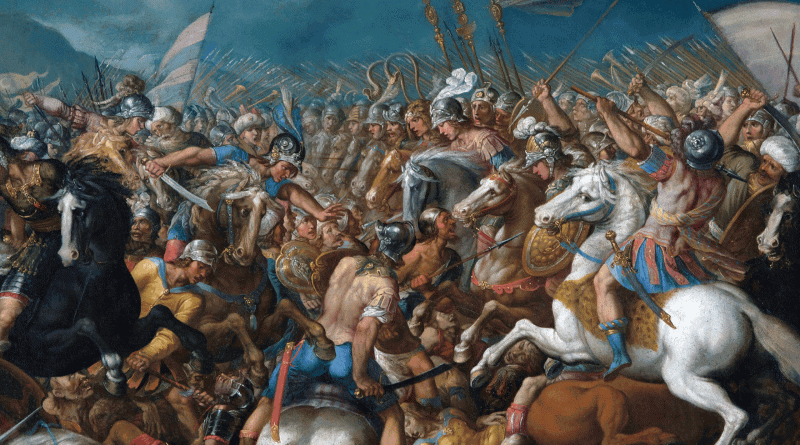Conquest and Conflict: Unraveling the Epic Tale of the Battle of New Carthage
Introduction
The Battle of New Carthage stands as a pivotal moment in ancient history, marking a significant clash between two mighty powers of the Mediterranean world. This conflict, which occurred during the third century BCE, not only shaped the geopolitical landscape of the time but also left a lasting legacy that resonates through the annals of history.
The Battle of New Carthage
In the third century BCE, the ancient city of Carthage, situated in present-day Tunisia, was a dominant maritime power in the Mediterranean. However, its ambitions clashed with those of Rome, leading to a series of conflicts known as the Punic Wars. One of the crucial battles of this period was the Battle of New Carthage.
Unveiling the Historical Epic
The Battle of New Carthage stands as a testament to the relentless pursuit of power and dominance in the ancient world. As one of the pivotal conflicts of the third century BCE, it encapsulates the fierce rivalry between two mighty powers of the Mediterranean: Rome and Carthage. This introduction sets the stage for an exploration into the causes, events, and consequences of this historic clash.
Causes and Catalysts
Territorial disputes, economic rivalries, and political tensions served as the primary catalysts for the Battle of New Carthage. Both Rome and Carthage sought to expand their spheres of influence, leading to inevitable confrontations. The struggle for control over strategic territories and lucrative trade routes fueled animosities and laid the groundwork for a conflict that would shape the course of history.
Legacy and Lessons Learned
The legacy of the Battle of New Carthage reverberates through the annals of history, leaving an indelible mark on the Mediterranean world and beyond. From its military strategies to its geopolitical implications, the battle offers valuable insights into the dynamics of ancient warfare and the complexities of power dynamics. By delving into its legacy, we uncover enduring lessons that continue to resonate in contemporary times, reminding us of the enduring relevance of studying our past.
Causes of the Conflict
The Battle of New Carthage was fueled by various factors, including territorial disputes, economic rivalry, and political tensions between Rome and Carthage. Both powers sought to expand their influence, leading to inevitable confrontations.
Key Players Involved
The primary actors in the Battle of New Carthage were Rome and Carthage, but the involvement of local tribes and mercenaries added complexity to the conflict.
Military Strategies Employed
During the battle, both sides employed diverse military strategies, including naval tactics, siege warfare, and diplomatic maneuvers, showcasing the sophistication of ancient warfare.
Major Events During the Battle
The conflict witnessed several significant events, from initial skirmishes to decisive turning points that ultimately shaped the outcome of the battle.
Impact of the Battle
The Battle of New Carthage had far-reaching consequences, impacting the political landscape, economic dynamics, and social fabric of the Mediterranean region.
Legacy of the Battle
The legacy of the Battle of New Carthage reverberated through subsequent centuries, influencing historical narratives and cultural perceptions of power and conquest.
Analysis and Interpretation
Through a critical analysis of the battle, historians glean valuable insights into the strategies, motivations, and consequences of ancient warfare, offering lessons that remain relevant today.
Conclusion
In conclusion, the Battle of New Carthage stands as a testament to the relentless pursuit of power and dominance in the ancient world. By examining its intricacies, we gain a deeper understanding of the forces that shaped the course of history.
FAQs
What were the main causes of the conflict between Rome and Carthage?
The conflict between Rome and Carthage stemmed from territorial disputes, economic competition, and political rivalries, fueled by their ambitions for dominance in the Mediterranean.
How did the Battle of New Carthage impact the surrounding regions?
The Battle of New Carthage had significant political, economic, and social repercussions, reshaping the balance of power and influencing subsequent events in the Mediterranean.
What military strategies were employed during the Battle of New Carthage?
Both Rome and Carthage utilized a range of military tactics, including naval maneuvers, siege warfare, and diplomatic negotiations, showcasing the complexity of ancient warfare.
What was the legacy of the Battle of New Carthage?
The battle left a lasting legacy, shaping historical narratives and cultural perceptions of power and conquest, while also offering valuable insights into the dynamics of ancient warfare.
How does the Battle of New Carthage resonate in contemporary times?
The lessons learned from the Battle of New Carthage continue to inform our understanding of geopolitical conflicts and the complexities of international relations, highlighting the enduring relevance of ancient history.



